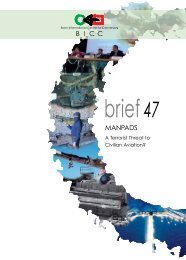egypt-final-presidential-elections-2012
egypt-final-presidential-elections-2012
egypt-final-presidential-elections-2012
Create successful ePaper yourself
Turn your PDF publications into a flip-book with our unique Google optimized e-Paper software.
The Carter Center<br />
Presidential Election in Egypt<br />
FOR IMMEDIATE RELEASE<br />
May 26, <strong>2012</strong><br />
Executive Summary of Carter Center Preliminary Statement !<br />
on Egypt's Presidential Election<br />
Read the full preliminary statement:<br />
$%!&%'()*+<br />
The Carter Center election witnessing mission was accredited in Egypt by the Presidential Election<br />
Commission (PEC) on May 3, <strong>2012</strong>. Accreditation badges, necessary for witnesses to observe the<br />
process, were only provided on May 16, less than seven days before the election. The Carter Center<br />
mission, which is led by former U.S. President Jimmy Carter, includes a total of 102 witnesses from 35<br />
countries who visited 909 polling stations in 25 governorates to follow voting, counting, and tabulation.<br />
The Center's witnesses continue to assess the conclusion of the vote tabulation, and will remain in Egypt<br />
to follow the runoff election and the post-election environment. This statement is preliminary; a <strong>final</strong><br />
report will be published four months after the end of the electoral process. The Carter Center mission to<br />
Egypt is limited in scope due to the late stage of accreditation, the limitation that witnessing missions<br />
could not issue statements prior to polling, and a 30-minute time limit restriction on witnesses' presence<br />
inside polling stations.<br />
Executive Summary<br />
Egypt's first <strong>presidential</strong> election in the post-Mubarak era marks the first time in Egypt's history that the<br />
head of state will be directly elected by the people in a competitive election.<br />
Due to restrictions imposed on election witnesses by Egypt's electoral authorities that prevented<br />
assessment of critical pre-election phases including voter registration and campaigning, The Carter<br />
Center was only able to conduct a limited mission focusing on voting, counting, and vote tabulation. As a<br />
result, the Center is unable to reach a conclusion about the process as a whole. The Center's limited<br />
mission found that the polling process was peaceful and orderly and marked by a sense of hope in<br />
Egypt's struggle for democracy. The Center noted an important new measure to promote transparency -<br />
counting at the polling station in the presence of candidate agents and witnesses. At the same time, the<br />
Center also found that election authorities prohibited access to the <strong>final</strong> aggregation of national results,<br />
undermining the overall transparency of the process. Final results have not been announced yet and the<br />
electoral process is ongoing.<br />
The broader context in which these <strong>elections</strong> were held is a cause for concern. To date, several<br />
fundamental questions remain unanswered and continue to cast uncertainty over the continued<br />
transition process, including the degree to which the powers of the new president will be balanced by<br />
other institutions. While the Center's assessment of the voting and counting process is generally<br />
positive thus far, it falls within this larger context of concerns about key aspects of the legal and electoral<br />
framework. In summary, the Center finds that:<br />
82



